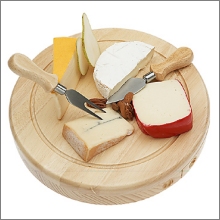Cheese, Glorious Cheese:
Is It Good for You or Not?
by www.SixWise.com
In the last 50 years, cheese consumptions has grown nearly 300 percent in the United States, making it one of the most adored dairy products there is. Similar to wine, cheese-making has been considered an art since ancient times more than 10,000 years ago, and today there are more than 1,000 varieties to choose from.
|

There are over 1,000 varieties of cheese!
|
Is Cheese a Healthy Addition to Your Diet?
Cheese has gotten a bad rap in recent years because of its high saturated fat content, leading most nutritionists to recommend eating low-fat or fat-free cheese products as part of a healthy diet.
However, this is a hotly debated topic, as some experts believe that saturated fats are actually good for you. Saturated fats are necessary for energy, hormone production, and cellular membranes, among other biological functions, and according to Mary Enig, PhD, the diet should contain at least 25 percent of fat as saturated fat.
Meanwhile, cheese is more than just a source of fat, it's filled with numerous healthy nutrients, including:
-
Protein: Humans need protein to build amino acids.
- Calcium: The calcium in cheese has been found to help protect colon cells from cancer-causing chemicals, prevent bone loss from rheumatoid arthritis or after menopause, prevent migraine headaches and reduce the symptoms of PMS.
Further, eating calcium-rich foods like cheese is a better method to strengthen your bones than taking calcium supplements alone, according to researchers from Washington University in St. Louis. Studies have also suggested that eating calcium-rich foods can contribute to weight loss.
-
Conjugated Linoleic Acid (CLA): Cheese from grass-fed cows is an excellent source of CLA,a healthy fat that may reduce your risk of metabolic syndrome and cancer.
|

Cheese made with raw milk from grass-fed cows may be among the healthiest there is.
|
Are Certain Cheeses Healthier Than Others?
Some experts believe that cheese produced with raw milk is superior to pasteurized versions. According to the Weston A. Price Foundation:
"Pasteurization destroys enzymes, diminishes vitamin content, denatures fragile milk proteins, destroys vitamins C, B12 and B6, kills beneficial bacteria, promotes pathogens and is associated with allergies, increased tooth decay, colic in infants, growth problems in children, osteoporosis, arthritis, heart disease and cancer."
Cheese made from raw milk may be preferable, according to Thomas Cowan, MD from Michigan State Medical School, because:
-
Unpasteurized milk has the enzyme phosphataze that allows the body to absorb the calcium from the milk. This allows for the digestion of lactose.
-
Milk before pasteurization is rich in colloidal minerals and enzymes, which are necessary for the absorption and utilization of sugars and fats in the milk.
-
When milk is heated it becomes precipitated with minerals that cannot be absorbed, contributing to osteoporosis, as well as sugars that cannot be digested and fats that are toxic.
-
Unpasteurized milk has a cortisone-like factor in the cream, which is heat sensitive. This aids in combating allergies.
-
Unpasteurized milk has beneficial bacteria and lactic acids, which implant in the intestines and contribute to a balanced immune system.
When choosing healthy cheeses, also keep an eye out for whether or not they're processed. Processed cheese contains added salt, artificial flavors and artificial colors. Ideally, choose natural cheeses like feta, blue cheese, cheddar, gouda, jarlsberg, brie, ricotta, Monterey jack, or parmesan over processed cheeses with added flavors and colors (like yellow American cheese).
So there's good news for cheese lovers around the world -- as part of a varied diet cheese is not only delicious, it's healthy too.
Recommended Reading
Eating Red Meat: Once and for All, Is it Bad for You or Good for You?
Artichokes: The Phytochemical-Rich Thistle Vegetable with an Interesting History
Sources
World's Healthiest Foods: Cheese
Institute of Food Technologists
Green Pastures Dairy, Inc.